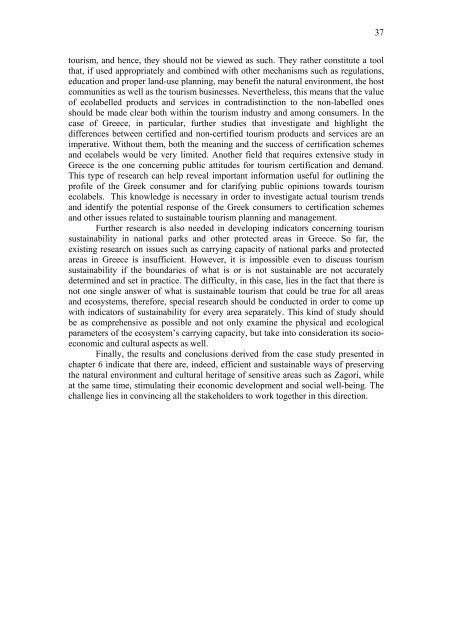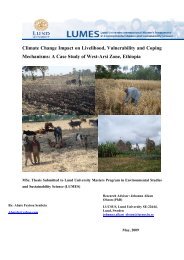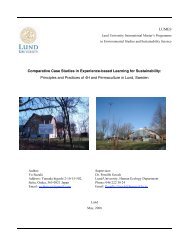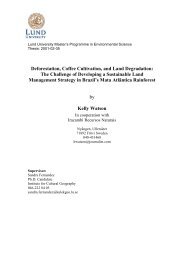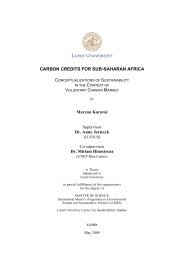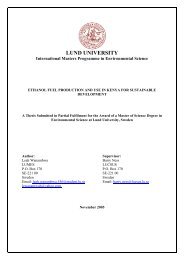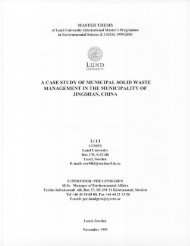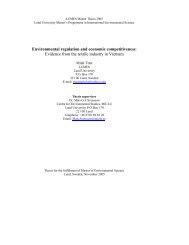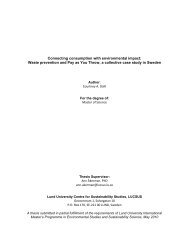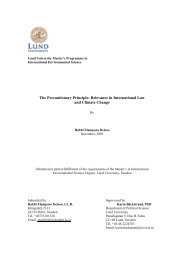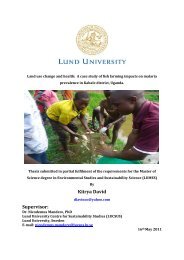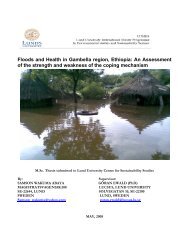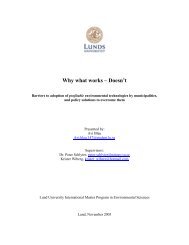Thesis title: âThe development of community-based ecotourism - lumes
Thesis title: âThe development of community-based ecotourism - lumes
Thesis title: âThe development of community-based ecotourism - lumes
Create successful ePaper yourself
Turn your PDF publications into a flip-book with our unique Google optimized e-Paper software.
37tourism, and hence, they should not be viewed as such. They rather constitute a toolthat, if used appropriately and combined with other mechanisms such as regulations,education and proper land-use planning, may benefit the natural environment, the hostcommunities as well as the tourism businesses. Nevertheless, this means that the value<strong>of</strong> ecolabelled products and services in contradistinction to the non-labelled onesshould be made clear both within the tourism industry and among consumers. In thecase <strong>of</strong> Greece, in particular, further studies that investigate and highlight thedifferences between certified and non-certified tourism products and services are animperative. Without them, both the meaning and the success <strong>of</strong> certification schemesand ecolabels would be very limited. Another field that requires extensive study inGreece is the one concerning public attitudes for tourism certification and demand.This type <strong>of</strong> research can help reveal important information useful for outlining thepr<strong>of</strong>ile <strong>of</strong> the Greek consumer and for clarifying public opinions towards tourismecolabels. This knowledge is necessary in order to investigate actual tourism trendsand identify the potential response <strong>of</strong> the Greek consumers to certification schemesand other issues related to sustainable tourism planning and management.Further research is also needed in developing indicators concerning tourismsustainability in national parks and other protected areas in Greece. So far, theexisting research on issues such as carrying capacity <strong>of</strong> national parks and protectedareas in Greece is insufficient. However, it is impossible even to discuss tourismsustainability if the boundaries <strong>of</strong> what is or is not sustainable are not accuratelydetermined and set in practice. The difficulty, in this case, lies in the fact that there isnot one single answer <strong>of</strong> what is sustainable tourism that could be true for all areasand ecosystems, therefore, special research should be conducted in order to come upwith indicators <strong>of</strong> sustainability for every area separately. This kind <strong>of</strong> study shouldbe as comprehensive as possible and not only examine the physical and ecologicalparameters <strong>of</strong> the ecosystem’s carrying capacity, but take into consideration its socioeconomicand cultural aspects as well.Finally, the results and conclusions derived from the case study presented inchapter 6 indicate that there are, indeed, efficient and sustainable ways <strong>of</strong> preservingthe natural environment and cultural heritage <strong>of</strong> sensitive areas such as Zagori, whileat the same time, stimulating their economic <strong>development</strong> and social well-being. Thechallenge lies in convincing all the stakeholders to work together in this direction.


